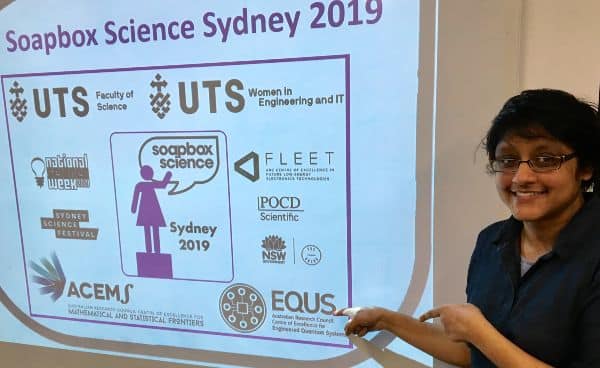As a high school student not so long ago, Riddhi Gupta remembers being fascinated by her time in the science labs and with scientists in general.
“Those early experiences with science stayed on with me, and motivated me to take on a PhD in quantum mechanics,” Riddhi, a research scholar at the University of Sydney, told Indian Link.
So valuable was that experience, that Riddhi is now passionate about talking to other young people about science and about engaging with STEM, and encouraging them to take it on as a career.

As a presenter at Sydney’s inaugural Soapbox Science program, she is one of 12 women scientists who will take science to the masses at a public event at Circular Quay.
Soapbox Science is quite literally a public event, where presenters talk about science at a busy public spot (like the orators at the Speakers’ Corner at London’s Hyde Park).
An initiative that started off in the UK, it is scheduled for 10 Aug at the start of National Science Week (10-18 Aug).
“Come along to see us busking science!” Riddhi laughed. “Soapbox Science is grassroots-oriented program that has great value in making science accessible.”
Fellow presenter Prof. Arti Agarwal of UTS, agreed. “It’s about taking science to the public in an approachable, acceptable and interactive manner – no powerpoints, or even a science-aware audience,” she detailed. “We take science to the people, rather than wait for the people to come to science.”

It aims to demystify scientists by showing that they come from all walks of life, and clear the misconception that they, as Prof. Agarwal described, are “white guys in lab coats with glasses”. “Science is open to everyone regardless of gender or race, and it can be interesting, fun and cool.”
“We need to break down mental barriers that young people have about maths and science,” Riddhi stressed. “They’ll tell you they are not smart enough, and to them I’d like to say, you don’t have to be smart, just curious! It’s like music or sport – the more you practice, the better you get.”
And this is where Riddhi has a problem with popular perception about quantum physics – eg Big Bang Theory – that you have to be a genius to get it. “You just have to be curious. And have the patience to read.”
An equally significant aim of Soapbox Science is to counter the watering down of the scientific temperament that we have begun to see in society.
“It’s getting hard in our world to divorce real fact from misinformation,” Riddhi lamented. “There’s a real danger people are consuming information that is not scientifically correct. We need not only to present information to society, but also to help them synthesize these data points to make rational decisions for future generations.”
Prof. Agarwal added, “There are doubters amongst the public, yes. We must continue to work in a way that members of the public trust scientists and ask their political representatives to inform policy decisions based on good science.”
To encourage girls in STEM and IT is a particular passion for Prof. Agarwal. “In the engineering classroom I’m still seeing one girl to every ten boys.” She runs a program for female students where they buddy up with senior students and meet with industry mentors in an informal space. “I’d like my young female students to know they don’t have to be isolated and can meet similar others over a coffee and a laugh, exchange information, and set up networks and find opportunities to collaborate.”
She identifies that Indian-origin girls may well be ahead of their mainstream counterparts here.
“India has strong STEM education and the numbers for girls are higher. Those of us who move overseas – I myself have a University of Delhi and IIT background even though I also studied in the UK – we are bright and hardworking, but we have to work three times harder to prove ourselves, and we are that good, but race is holding us back.”
Riddhi, in her idealism, cares more about the science at this point in her career, rather than about diversity. “I feel we need to focus on great research instead, not emphasize that the scientist is XYZ. It draws attention away from the science itself, and that may not be healthy for dialogue.”
She herself will be talking at Soapbox about her work in making quantum devices. “I will show you what these devices look like, what quantum properties are and why they are different to how we experience the world normally. I’ll show you how we borrow ideas from robotics, machine learning and engineering to help improve the way quantum devices work. I’ll explain why there’s a global push to make the first quantum computer. Together, we can speculate how these devices might affect our future lifestyles.”
Prof. Agarwal will talk about her work in optics: modelling of photonic components such as solar cells, optical fibers, sensors, lasers etc.
More details on the Soapbox Science website.
Science busking – how these women are leading the way

Reading Time: 4 minutes



